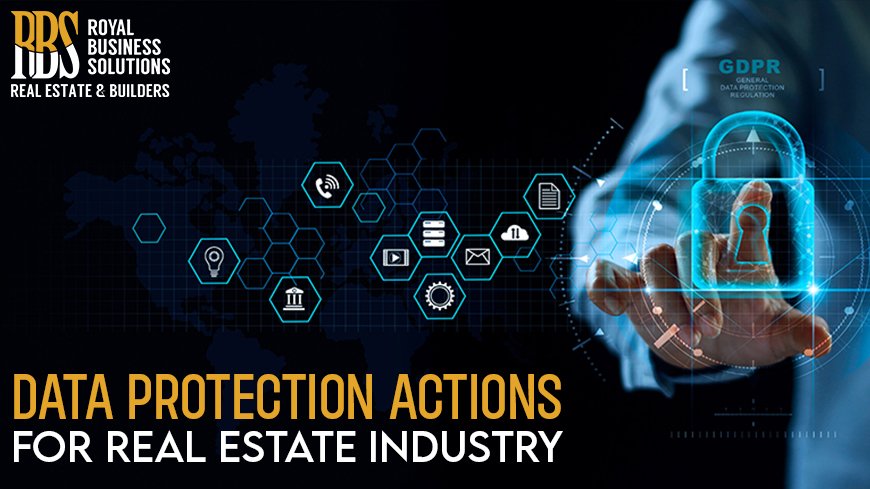- October 31, 2023
- Posted by: Muhammad Shehzad
- Category: Blogs

Introduction
In the current digital era, data is a valuable resource, and its protection is crucial for companies in a variety of industries. The real estate industry is no exception, as it deals with a lot of private information about clients, houses, financial transactions, and other factors. Moreover, ensuring the privacy and security of this data is critical not only for legal compliance but also for building and maintaining trust with clients and partners.
This blog will examine the crucial data protection actions that the real estate sector should implement to protect their valuable data.
Understanding the importance of data protection
Data protection is crucial in safeguarding sensitive information from unauthorized access, theft, or misuse. It protects national security, corporate ethics, and individual privacy. Moreover, data breaches can result in monetary losses, harm to one’s reputation, and legal implications. To maintain trust, compliance, and the continuous expansion of digital services and trade, strong data security measures are necessary in our increasingly digital and interconnected world.
What Actions are Used to Implement in Data Protection for the Real Estate Industry?
In the real estate sector, data protection involves safeguarding the personal and financial information of clients and tenants. Also, real estate professionals should use encryption and secure document storage, use access controls to limit data access, and update their software regularly to protect themselves from cyber-attacks.
Read: What Are The Best Strategies To Reduce Taxes On Real Estate Ever?
Here are some data protection actions used by the real estate sector to protect their priceless data:
Conduct a Data Audit
Before implementing data protection measures, it is essential to know what information you collect, store, and process. To determine all the different types of data your real estate business manages, such as customer information, financial records, property details, and personnel data, do a thorough data audit. This audit is the base of your data protection policy.
Secure Data Storage
Invest in secure data storage solutions. To protect the data stored on servers and in the cloud, implement strong access controls and encryption techniques. Further, patch and upgrade your systems routinely to prevent vulnerabilities.
Access Control
To ensure that only authorized individuals can access sensitive data, impose strict access controls. However, use permissions based on a user’s position to control what each employee can see and do with the data.
Regular Data Backups
Backup your data regularly to protect it from loss due to errors or online threats. These backups need to kept in a safe location, and their ability to restore should be regularly verified.
Data Encryption
Encrypt data both before it sent and after it arrives. Data is encrypted and then transformed into a secure format that is nearly impossible to read or interpret by unauthorized parties. Also, make sure that all devices and communication channels needed to access data are encrypted.
Data Retention Policies
Establish clear data retention policies to determine how long data needs to store. The risk of breaches and legal obligations grows when data is kept longer than is necessary. Review data on a regular basis and remove everything no longer needed while adhering to the rules.
Data Reduction
Use a data reduction strategy, gathering just the details required for the transaction or service offered. In addition to lowering the quantity of information that is in danger, this makes it easier to comply with data protection laws.
Regular Software Updates
Update all your software and programs. Software patches to address known vulnerabilities oftens found in updates. Your systems could be vulnerable if you don’t update your software.
Incident Response Plan
Despite all precautions, data breaches are still possible. To reduce the harm in the case of a breach, it is crucial to have a clearly defined incident response plan. Identifying and containing the breach, informing the affected parties, and working with law enforcement and regulatory authorities should all be part of this plan.
Compliance Recordkeeping
Keep thorough records of your compliance efforts and data protection processes. Furthermore, this supporting documentation is crucial for proving your dedication to data privacy in the event of regulatory investigations or legal issues.
Cyber Insurance
To safeguard your real estate company in the event of a data attack, consider investing in cyber insurance. However, in the case of a breach, cyber insurance can offer financial support for legal costs, client notifications, and reputation management.
Also Read: Want To Make An Investment In Digital Real Estate? What To Do First
Conclusion
Data protection is a critical concern for the real estate industry, given the wealth of sensitive information it handles. Additionally, by understanding relevant data security regulations, conducting data audits, implementing strong, and security measures, real estate businesses can build trust with clients. With a proactive approach to data protection, the real estate industry can thrive in the digital age while safeguarding sensitive information.
Capital Smart City is a good fit for future property investment.
